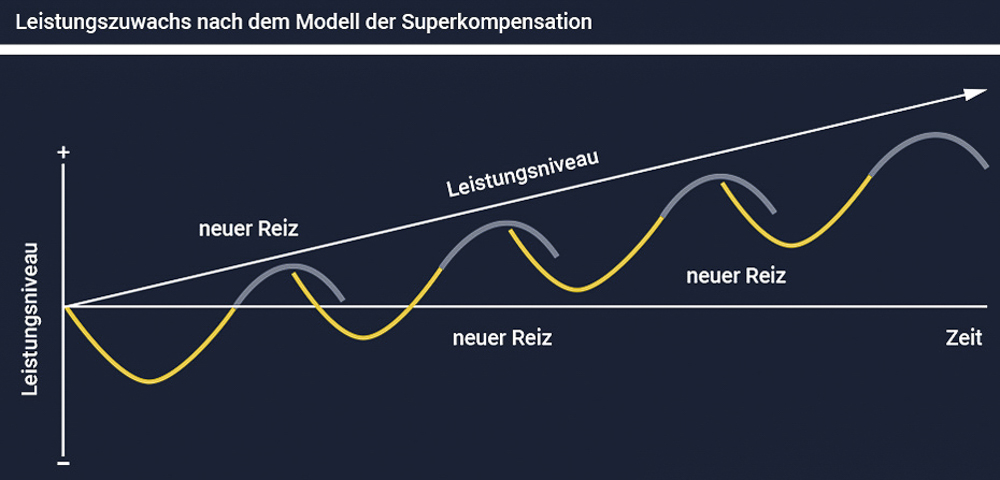Subscribe to the training camp news from SOCCATOURS and regularly secure the chance to win a football training camp for your team.

You have questions?
As a passionate footballer, you push yourself to your limits in training in order to constantly improve and impress on the pitch on match day. But why doesregular,intensive training actually lead to better performance? An important principle for every amateur footballer is so-called supercompensation. Here you can find out how supercompensation works, when you should ideally plan your next training session and why recovery phases arecrucial for improving your performance.
When you train, you expose your body to a load that disrupts its "normality", i.e. its usual performance level. This initially leads to fatigue - you become weaker because your energy stores are depleted and muscle damage occurs.
As soon as the training is over, your body starts to regenerate: it replenishes the energy stores, repairs the muscles and brings you back to your old level of performance. If the training was hard enough, your body goes one step further and increases its performance beyond the original level -this is called supercompensation. Now is the best time for further training to benefitfrom the new progress.


The optimal time for the next training session after supercompensation depends on several factors: your age, your performance level, the intensity of the training and your recovery. If you wait too long, the effect of supercompensation will be lost and your performance level will drop. If you start too early, you will not benefit from supercompensation and will remain at your current performance level. In the worst case, you may even endup overtraining.
Limits of the model
The supercompensation model is a simple but helpful concept that explains well how the body reacts to training stimuli. Supercompensation has a proven effecton energy stores (muscle and liver glycogen), but its effect on muscle strength and endurance is less certain. The basic idea remains the same: if you train regularly with sufficient intensity and give yourself enough time to recover, your body can continuously increase its performance .
Increasetraining intensity: Your body will only adapt if you make your training challenging enough. A load stimulus should demand at least 20-30% of your maximum performance capacity so that your body can adapt.
Incorporate variety: Your body will only adapt if you keep exposing it to new challenges. If you always train at the same intensity and with the same exercises, progress will eventually stop.
Plan regeneration : Sufficient recovery is crucial for supercompensation. Focus on sleep, a balanced diet and targeted regeneration measures such as stretching exercises, active recovery or massages.
The supercompensation model shows how your body improves through training: stress, fatigue, recovery and adaptation are all interlinked. Train in a targeted and varied way and make sure you don't overtax your body. This will help you get the most out of every training session and be optimally prepared on match day.

You have questions?